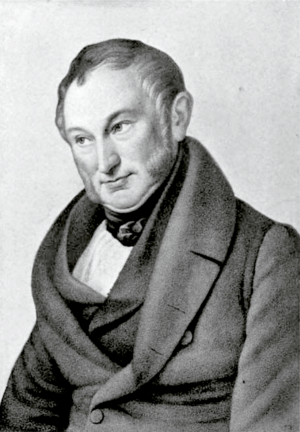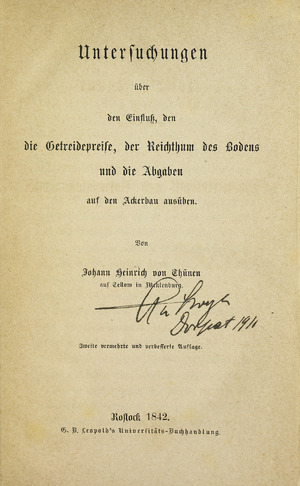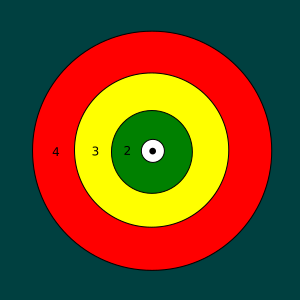Johann Heinrich von Thünen facts for kids
Quick facts for kids
Johann Heinrich von Thünen
|
|
|---|---|

Johann Heinrich von Thünen, age 57
|
|
| Born | 24 June 1783 Canarienhausen in present day Wangerland, Friesland
|
| Died | 22 September 1850 (aged 67) Tellow in present day Rostock
|
| Nationality | German |
| Field | Economic theory |
| School or tradition |
Classical economics |
| Alma mater | University of Rostock |
Johann Heinrich von Thünen (born June 24, 1783 – died September 22, 1850) was an important German economist. He lived in the 1800s. He was born in Mecklenburg-Strelitz, which is now part of northern Germany. Thünen is famous for his ideas about how land is used and how wages work.
Contents
What Did Thünen Study?
Understanding Thünen's Farm Land Model
Johann Heinrich von Thünen owned a large farm in Mecklenburg. In 1826, he wrote a book called The Isolated State. In this book, he shared his ideas about how people use land for farming. He also explained how the cost of land changes based on its location. This was one of the first times someone looked at how geography affects economics.
Thünen's model helps us understand why different types of farming happen at different distances from a city. It shows how farmers try to make the most profit.
How Thünen Imagined His "Isolated State"
To create his model, Thünen made some simple assumptions. Imagine a special "Isolated State" where:
- A single city is right in the middle.
- Wild land surrounds this state.
- The land is perfectly flat. There are no rivers or mountains.
- The soil quality and weather are the same everywhere.
- Farmers use oxcarts to take their goods to the central city. There are no roads.
- Farmers always try to earn the most money possible.
In this model, the type of farming depends on how much it costs to transport goods to the city. It also depends on how much rent a farmer can pay for the land.
The Four Rings of Farming Around a City
Thünen's model showed four main rings of farming activity around the central city:
- Ring 1: Dairy and Market Gardening
- This ring is closest to the city.
- Farmers here grow vegetables, fruits, and produce milk.
- These products spoil quickly, so they need to reach the market fast.
- Ring 2: Timber and Firewood
- This ring is just outside the first one.
- Wood was very important for heating and building.
- Wood is heavy and hard to move, so it was grown close to the city.
- Ring 3: Field Crops (like Grains)
- This zone is further out.
- Grains last longer than milk or vegetables.
- They are also lighter than wood, so transport costs are lower.
- Ring 4: Ranching
- This is the outermost ring of farming.
- Animals can walk themselves to the city for sale or butchering.
- This means farmers don't have to pay to transport them.
Beyond the fourth ring, Thünen imagined a wilderness. This area was too far from the city for any farming to be profitable.
Thünen's ideas helped historians understand how Europe's economy worked before factories became common.
Thünen's Ideas on Wages
In the second part of The Isolated State, Thünen also wrote about how wages should be set. He developed a mathematical idea for a "Natural Wage." He believed that workers should get a share of the profit. This share would be based on how much they produced and how much they needed to live.
This idea was so important to him that he asked for his formula to be put on his tombstone when he died.
Thünen also created the term Grenzkosten, which means "marginal cost." This term is now widely used in economics.
See also
 In Spanish: Johann Heinrich von Thünen para niños
In Spanish: Johann Heinrich von Thünen para niños
- Ricardian rent
- Hotelling rent
- Alfred Weber
- Bid rent theory
 | Janet Taylor Pickett |
 | Synthia Saint James |
 | Howardena Pindell |
 | Faith Ringgold |



